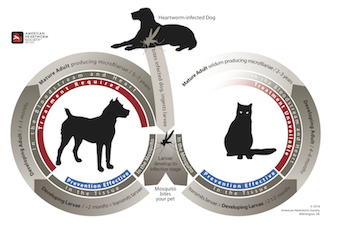Heartworm in dogs or cats is a disease in which a parasitic worm grows in the heart, lungs and associated blood vessels of affected pets. Heartworm disease is transmitted through the bite of an infected mosquito, which then deposits infective larvae into the bloodstream to circulate until it finds a good place to grow. The infective larvae can grow to adult worms more than a foot long, and cause severe lung disease, heart failure and damage to other organs in the body. Heartworm disease is serious and can be fatal.
Symptoms of heartworm infection show up relatively late in the process. Heartworm disease presents very differently in dogs and cats. In addition, the ability to treat heartworm is different between dogs and cats. In either case, heartworm prevention represents a far more cost-effective approach with a tremendous upside and no downside when properly prescribed and administered.
 Prevention medication should only be administered after a heartworm test has cleared the animal for it; otherwise giving preventives to an animal with adult heartworms could lead to rare, but possibly severe reactions, which could be fatal. Since different prevention medications have different parasite control profiles, your veterinarian can help you make the right decision based on your animal's particular case.
Prevention medication should only be administered after a heartworm test has cleared the animal for it; otherwise giving preventives to an animal with adult heartworms could lead to rare, but possibly severe reactions, which could be fatal. Since different prevention medications have different parasite control profiles, your veterinarian can help you make the right decision based on your animal's particular case.
Heartworm in Dogs
From the time a dog is bitten by an infective mosquito, to the time a positive test confirming infection can be achieved, is 6 to 7 months. During this time, damage to the infected individual begins. In dogs, the worm eventually grows up to 13 inches and sets up housekeeping in the pulmonary artery and its branches that supply the lungs and the right side of the heart, slowing blood flow and compromising your animal’s health.
The adult worms are responsible for the clinical signs, which include coughing, exercise intolerance, fainting, lethargy, weight loss, coughing up blood, and, in the worst cases, congestive heart failure. If your dog presents any of these symptoms, call your veterinarian for an appointment immediately.
Heartworm disease in dogs is treatable, but has many difficulties. The treatment occurs over several months, requires multiple drugs that can be costly, and some of the drugs come with their own risks. The primary drug used to kill the adult worms is an arsenical derivative. Most dog owners, as well as veterinarians, would prefer not to find themselves in a situation where such a drug is necessary. Needless to say, prevention is far easier, more affordable and comes with essentially no risk to your pet.
Heartworm in Cats
In cats, it's a bit more complicated with the signs mimicking asthma, both on x-ray and with a chronic wheezy cough. Cats respond differently to the few adult worms that can develop. Heartworm disease in cats can be managed, but unlike dogs, cats cannot be treated for heartworm infection, which makes an extremely good case for prevention.
If your cat is coughing or presents asthma-like symptoms, call your veterinarian for an appointment immediately.
This may seem new. However, because we now recognize that cats get heartworm disease, and the drugs have been approved for use in cats, we now recommend that every cat should be on a heartworm preventative, along with every dog.
Heartworm and the SF Bay Area
In the SF Bay Area, the risk of heartworm spread is greater, due to the prevalence of coyotes and the Western Tree Hole mosquito. On the Peninsula, these mosquitos are particularly active, and can reside higher up trees than our local mosquito abatement efforts typically reach.
The risk increases in locations along creeks or near open space where coyotes roam. Even indoor pets are at risk. Studies have shown the percentage of heartworm-infected mosquitoes is actually higher in the indoor population versus the outdoor population of mosquitoes. The mature Western Tree Hole Mosquito picks up heartworm from the coyote, and then seems to seek the indoors where it is thought to be easier for the infected mosquito to fly.
Again, as with dogs, prevention is far easier, more affordable and comes with essentially no risk to your cat.
Prevention is Key
Obtaining heartworm prevention is easy. It requires that your dog or cat be tested for heartworm first. If the test comes up negative, we can start the animal on a preventative, which is administered monthly. Heartworm testing can be arranged; simply call the hospital and make an appointment for a heartworm test. Or, we'd be happy to arrange for a veterinary technician to come to you.

